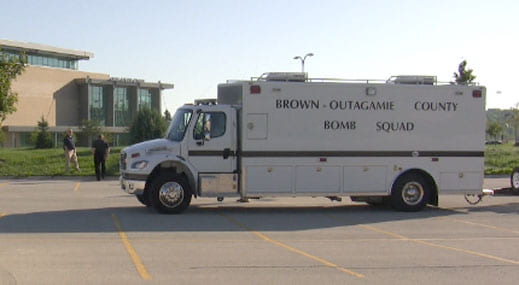UW-Green Bay Police host Bomb Squad training

The UW-Green Bay Police Department recently welcomed the Brown-Outagamie County Bomb Squad to campus for a full day of training. Officials say it was a great opportunity to practice their skills in a variety of real-world settings, and to enhance all-important relationships between local law enforcement agencies.
“What’s going on today is we’ve invited the Brown-Outagamie county bomb team to campus, and we’re going to be placing some devices — some fake devices — around the campus and they’re going to be doing exercises,” said UW-Green Bay Police Chief Tom Kujawa. “They’re going to be doing their training, along with our officers, on how to properly handle the situation.”
Lt. Chris Knurr is with the Brown-Outagamie Bomb Squad. He and his colleagues jumped at the chance to train on campus.
“I said that was a great idea, it’d be perfect for us to come out and train in real-world environments,” Knurr said. “Usually we do our training in quarries, abandoned buildings, out in the open — so it’s very sterile. We don’t have the couches, the chairs, the bleachers, the risers that we need to navigate through in the real world. … So it’s invaluable training, to get out here and train in that environment.”
Kujawa agreed.
“You can sit around a table and talk about how you’re going to do things,” he said, “but until they put on the bomb suit — and you’ll see them when they put them on — it’s a very heavy piece of equipment, very hot piece of equipment. … So it forces everybody to prepare for the real thing.”
The training is part of a larger effort to enhance relationships with other local law enforcement agencies, Kujawa said. Officers have taken campus tours and more training likely will be held in the future.

“One of the efforts that we’re trying to do here in Public Safety is, we’re reaching out to the local law enforcement agencies,” Kujawa said, “and you know, trying to have them come on to campus, be more familiar with campus — trying to build some type of partnerships with each other, where we know what to expect from them and they know what to expect from us.”
Improved relationships benefit all involved agencies, as well as civilians, Knurr added.
“It’s having that trust and that comfort working with the local authorities,” he said. “We basically work with them all the time when we’re on a call out — so building that trust factor, it’s just a great feeling to have.”
(This text closely approximates the embedded video’s audio content, including narration and interviews, and may include additional detail.)




